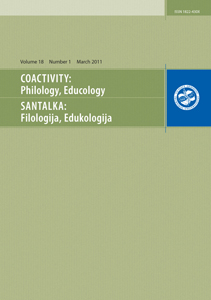Attitudes to Improving Speaking Skills by Guided Individual Activities
Attitudes to Improving Speaking Skills by Guided Individual Activities
Author(s): Ligija Kaminskienė, Galina KavaliauskienėSubject(s): Social Sciences
Published by: Vilnius Gediminas Technical University
Keywords: English for Specific Purposes; guided individual learning; attitudes to speaking activities
Summary/Abstract: Students’ perceptions of difficulties in speaking on professional issues are in the focus of the present article. It is generally assumed that the skill of speaking a foreign language is very difficult to master, while speaking on professional topics involves such difficulties as the usage of specific vocabulary and ability to deal with listeners’ oncoming arguments. The aims of the current research are to investigate learners’ attitudes to the level of difficulty in speaking activi - ties on a subject matter at university and apply an innovative approach to improving their speaking skills. The methodology applied was focused on guided individual learning (GIL), with gradually increasing amount of spontaneity in public talks on the subject matter, starting with prepared short talks on an ESP issue leading to group discussions; moving on to Power Point presentations, involving spontaneous deviations from the subject and followed by question time; further, adding some complex subject matter, such as a discussion on a problematic professional subject suggested by learning materials; and, eventually, speaking impromptu on an issue, with a high level of control of one’s speaking skills. The research method of the learners’ attitudes employed the survey on learner attitudes to four different speaking activities in the classroom, which included short talks, Power Point Presentations, discussions and speaking impromptu. The questionnaire was administered to students of two different specializations by the end of the semester. The respondents were students who studied Psychology and Social Work at the Faculty of Social Policy, at Mykolas Romeris University in Vilnius, Lithuania. The respondents were asked to indicate the degree of difficulty they had with the various speaking activities on the Likert’s scale ranging from “very difficult” (1) to “very easy” (5). The results indicated that perceptions of difficulties to developing speaking skills depended, on the one hand, on students’ chosen specialization: students of Psychology were more positive about speaking activities than students of Social Work. The differences of opinions might be caused by the level of proficiency in General English which influences the performance in professional language. On the other hand, the responses depended on the type of assignments: students felt more confident with themselves if they invested more individual learning time for their assignments. By the end of the semester, students self-assessed their achievements in improving speaking skills by contributing written reflections to individual weblogs. The analysis of contributions suggests the usefulness of the approach to perfecting professional speaking skills.
Journal: Santalka: Filologija, Edukologija
- Issue Year: 22/2014
- Issue No: 1
- Page Range: 39-48
- Page Count: 9
- Language: English

